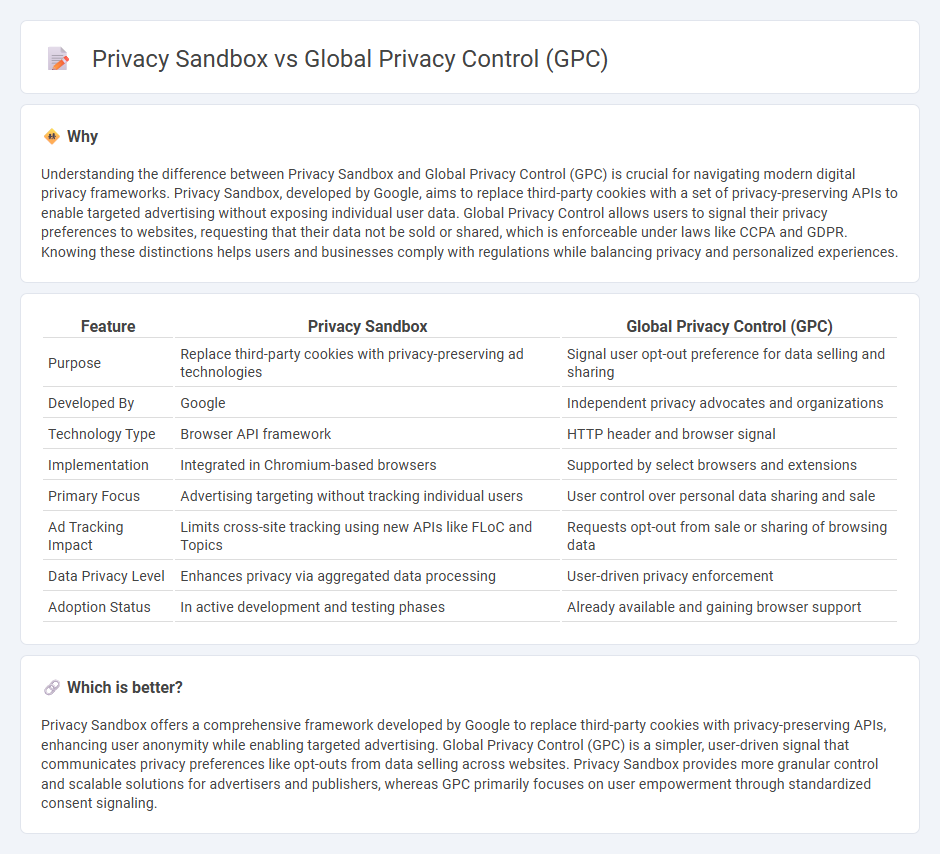
Privacy Sandbox is a Google-led initiative focused on creating web standards that enhance user privacy by restricting cross-site tracking while still supporting targeted advertising. Global Privacy Control (GPC) is a browser-based signal that communicates users' preferences to opt out of data selling and sharing, aligning with privacy regulations like CCPA and GDPR. Discover how these two privacy technologies are reshaping digital privacy and user control.
Why it is important
Understanding the difference between Privacy Sandbox and Global Privacy Control (GPC) is crucial for navigating modern digital privacy frameworks. Privacy Sandbox, developed by Google, aims to replace third-party cookies with a set of privacy-preserving APIs to enable targeted advertising without exposing individual user data. Global Privacy Control allows users to signal their privacy preferences to websites, requesting that their data not be sold or shared, which is enforceable under laws like CCPA and GDPR. Knowing these distinctions helps users and businesses comply with regulations while balancing privacy and personalized experiences.
Comparison Table
| Feature | Privacy Sandbox | Global Privacy Control (GPC) |
|---|---|---|
| Purpose | Replace third-party cookies with privacy-preserving ad technologies | Signal user opt-out preference for data selling and sharing |
| Developed By | Independent privacy advocates and organizations | |
| Technology Type | Browser API framework | HTTP header and browser signal |
| Implementation | Integrated in Chromium-based browsers | Supported by select browsers and extensions |
| Primary Focus | Advertising targeting without tracking individual users | User control over personal data sharing and sale |
| Ad Tracking Impact | Limits cross-site tracking using new APIs like FLoC and Topics | Requests opt-out from sale or sharing of browsing data |
| Data Privacy Level | Enhances privacy via aggregated data processing | User-driven privacy enforcement |
| Adoption Status | In active development and testing phases | Already available and gaining browser support |
Which is better?
Privacy Sandbox offers a comprehensive framework developed by Google to replace third-party cookies with privacy-preserving APIs, enhancing user anonymity while enabling targeted advertising. Global Privacy Control (GPC) is a simpler, user-driven signal that communicates privacy preferences like opt-outs from data selling across websites. Privacy Sandbox provides more granular control and scalable solutions for advertisers and publishers, whereas GPC primarily focuses on user empowerment through standardized consent signaling.
Connection
Privacy Sandbox and Global Privacy Control (GPC) are both initiatives aimed at enhancing online privacy by limiting third-party tracking and giving users more control over their data. Privacy Sandbox, developed by Google, replaces third-party cookies with privacy-preserving APIs for targeted advertising, while GPC is a browser signal that communicates user preferences to opt-out of data selling and sharing. Together, they represent complementary approaches to enforcing user privacy standards across the web ecosystem.
Key Terms
User Consent
Global Privacy Control (GPC) is a standardized signal enabling users to express their privacy preferences directly to websites, effectively communicating consent choices without individual site settings. Privacy Sandbox, initiated by Google, aims to protect user data by creating privacy-preserving APIs that limit cross-site tracking while still allowing targeted advertising, relying more on technology than direct consent signals. Explore how GPC and Privacy Sandbox complement and contrast each other in shaping the future of user consent and data privacy.
Third-party Cookies
Global Privacy Control (GPC) signals users' preferences to websites and third-party trackers, requesting the restriction of personal data sharing, effectively limiting third-party cookie tracking. Privacy Sandbox, developed by Google, aims to replace third-party cookies with privacy-preserving APIs that enable targeted advertising without exposing individual user data. Explore detailed comparisons and technical implications to understand how GPC and Privacy Sandbox reshape online privacy and advertising ecosystems.
Web Tracking
Global Privacy Control (GPC) is a browser signal that communicates a user's opt-out preference for data selling and sharing, aiming to enhance individual privacy by restricting cross-site tracking. Privacy Sandbox, developed by Google, introduces privacy-preserving APIs that replace third-party cookies with mechanisms like FLoC and Topics, designed to enable targeted advertising without exposing user-level browsing data. Explore detailed insights on how these initiatives impact web tracking and user privacy by learning more about their implementation and effectiveness.
Source and External Links
Global Privacy Control (GPC): Your Guide to Compliance - TrustArc - GPC is a universal mechanism that lets consumers opt out of the sale or sharing of their personal information across websites, with its signals legally recognized under privacy laws like the CCPA and CPRA.
Global Privacy Control - Wikipedia - GPC is a set of web technologies that signal a user's preference not to have their information sold or tracked, designed to have legal force unlike the earlier Do Not Track initiative.
Global Privacy Control (GPC) - California Department of Justice - GPC acts as a 'stop selling or sharing my data switch' in some browsers and must be honored by covered businesses in California as a valid consumer opt-out request under the CCPA.
 dowidth.com
dowidth.com